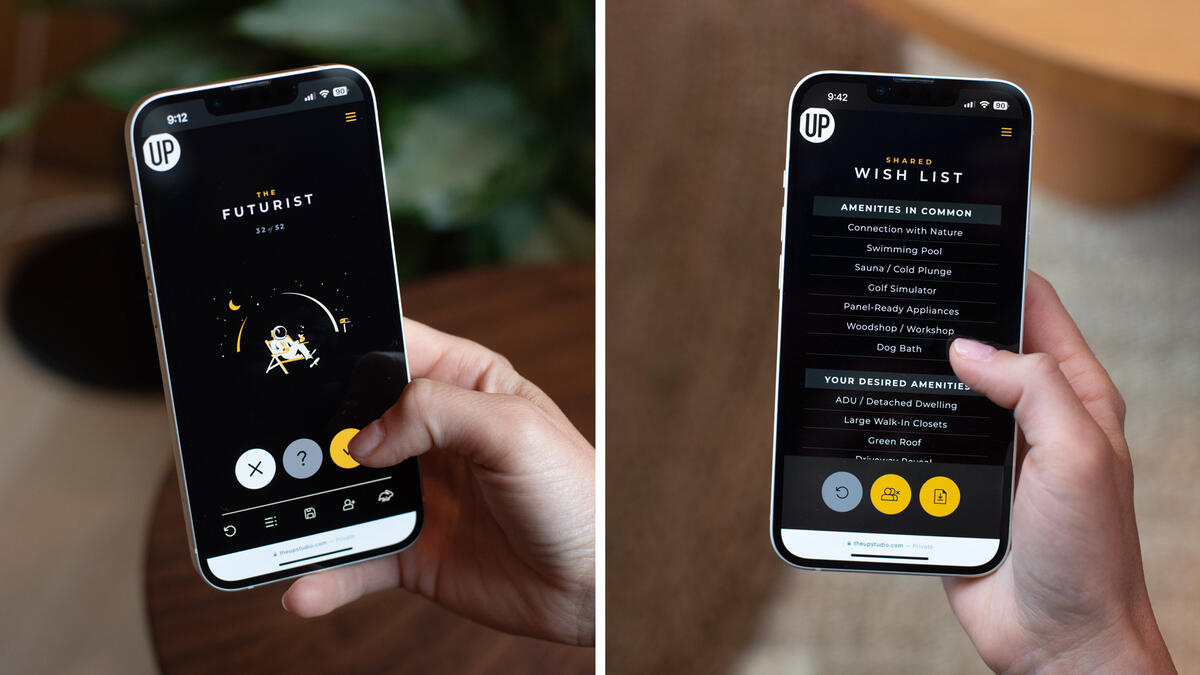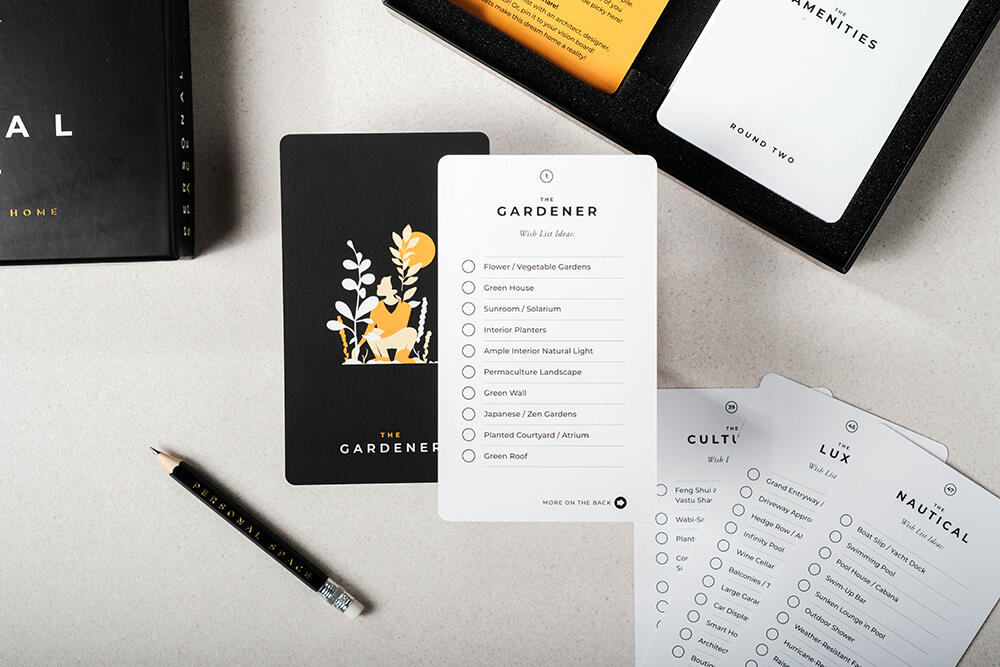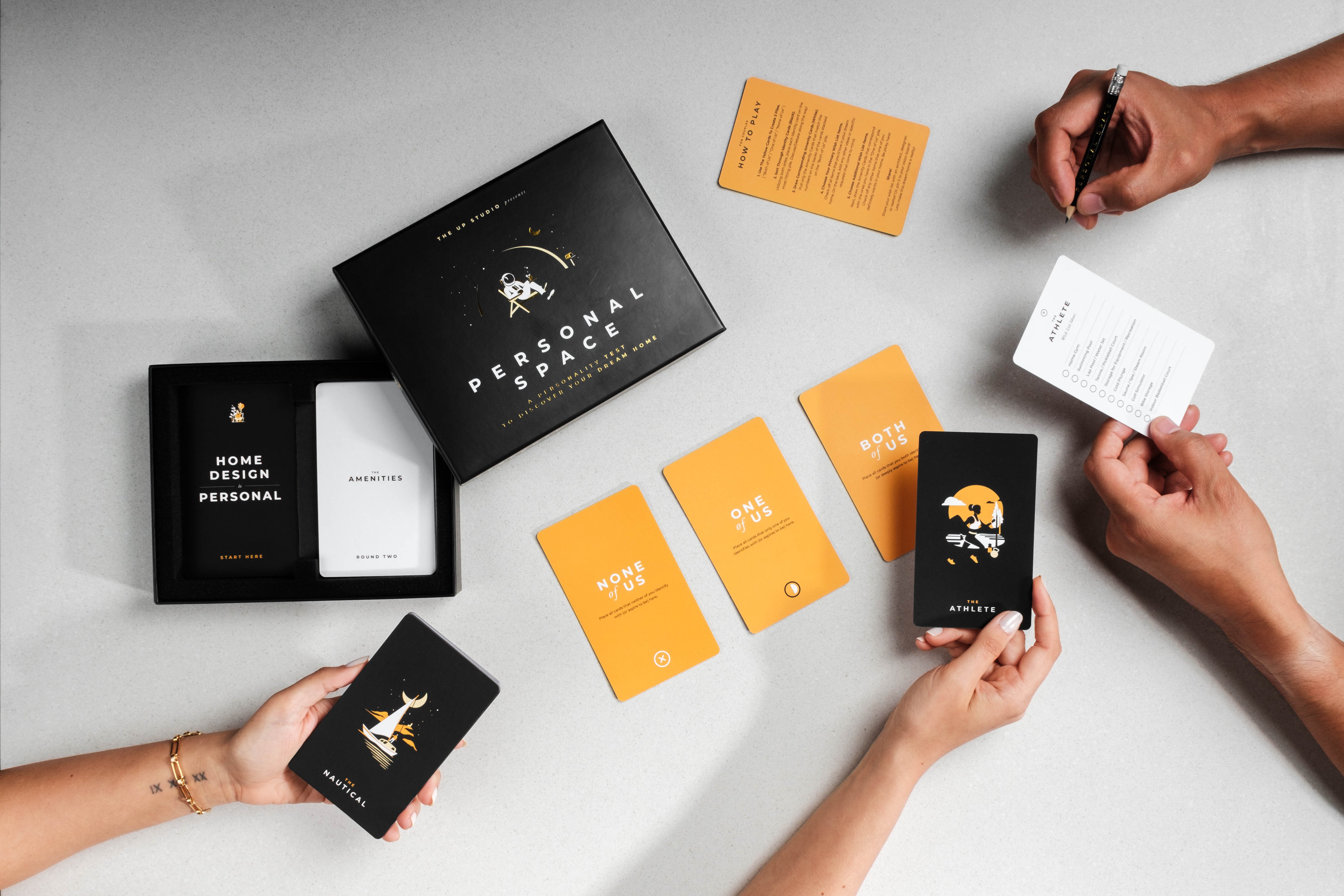The plight of the interior designer is getting clients to make decisions. Some homeowners come in fully equipped to explain their desires, and then there are those who know they want something different, but can’t articulate what; or those who are entirely overwhelmed at the prospect of creating a home from scratch. Long Island City, New York–based architecture and design firm The Up Studio came up with a clever way to level the playing field by turning that client discovery phase into a conversation card game.
Called Personal Space, the 52-card deck prompts homeowners to select a series of identities that resonate with them the most, and then reveals a variety of relevant amenities to consider for their custom home. So, “The Gardener” identity might include qualities like a green roof or a solarium, while “The Athlete” might involve a home gym and a trophy case—and players have the option to mix and match multiple identities and interests.
“The better we know our clients, the better homes we can design for them,” says Jeffrey Ramirez, a partner and brand designer at The Up Studio. “I was thinking about how we could really get to know a client better on day one, because they come to us with an expectation that we’re going to start designing right away—but the introductory questionnaire that we were doing, and that many other firms I think are using, wasn’t really [getting] us [to] a deeper level to actually get to know people personally.” Once they began using the conversation deck internally, Ramirez and his partners realized that other firms might want to use it too—and that homeowners embarking on a renovation or new build might want to play over a bottle of wine. “It’s a fun way for people to look at, ‘OK, what is my ideal wish list in a home?’ And they can see where that aligns with their partner’s wish list as well.”

Having begun using the game with their clients, Ramirez says it’s been helpful in a number of ways already. One client couple played the game with The Up Studio design team, and when the wife said she wouldn’t identify as an athlete, her husband stopped her. “He was like, ‘You run every day. You just ran a marathon. You are an athlete,’” he says. “It provided us with more personal details about them, but it was also interesting to see them realizing things about their own identities in real time.”
The card selection process helps the firm tailor their design approach accordingly. “We might have a client who doesn’t pick the ‘Environmentalist’ card, but sustainability is important to us as a firm, so we can approach a topic like geothermal power or solar panels in a different way to a client who says that’s not important to them,” says Ramirez. “Maybe for that client, we highlight the ways it’s economically sound instead.” Lastly, the game has also proved to be a quick way to notice any red flags, as it is typically played before a contract is signed. If clients are overly indecisive or spouses are openly arguing in front of the team over their visions, it’s a chance to find that out before the firm has invested too much in the relationship.
The deck will retail for $29 and be sold online and in a selection of stores starting in November, while a free digital version of the game launched in June. The digital edition has something of a Tinder-type feel, where users swipe right for yes and left for no on features like “pizza oven” or “pot filler.” The prompts get a little deeper as the swiping goes on, as questions about whether you’d like a pool slide or a treehouse give way to one about low-VOC materials, ADA accessibility and aging in place.
If you’re unsure where you stand on a certain prompt, there’s a question mark button that leads to The Up Studio’s detailed glossary of decorating terms. If you click, say, “center-facing seating arrangement,” you’ll see columns representing the value and the financial cost, along with a gallery of examples from the studio’s portfolio. An additional link takes users to a page that outlines the price ranges for various features presented in the deck, categorizing each into a bucket of “Cost Effective” (under $500 per square foot), “Mid Range” (around $700 per square foot), or “Hi-End Luxury” ($900-plus per square foot). When finished with the game, the user receives a personalized wishlist they can download or compare with a partner’s.

As he had never designed a card game before, Ramirez took inspiration from two precursors: Actually Curious, which focuses on personal values and is often used in team-building settings; and Brand Deck, which is meant to help burgeoning companies narrow in on their values and identity. He reached out to the company behind the former, Curiosity Lab, in order to get advice on the gameplay and parameters for Personal Space. “I definitely didn’t think I would ever design a game, and this isn’t where I imagined landing when I first started thinking about this issue [of client discovery],” he says.
In creating the game—which The Up Studio plans to update regularly if it takes off—Ramirez used his background in brand design to conform the color scheme and graphics to the firm’s branding, but he opted for a light touch. “We really do want it to be a tool that other designers and potential homeowners can use without feeling like they’re being pitched to the whole time,” he says. “All ships rise with the tide, and good design breeds more good design. It’s a fun idea, and it wasn’t something we wanted to keep to ourselves.”





























